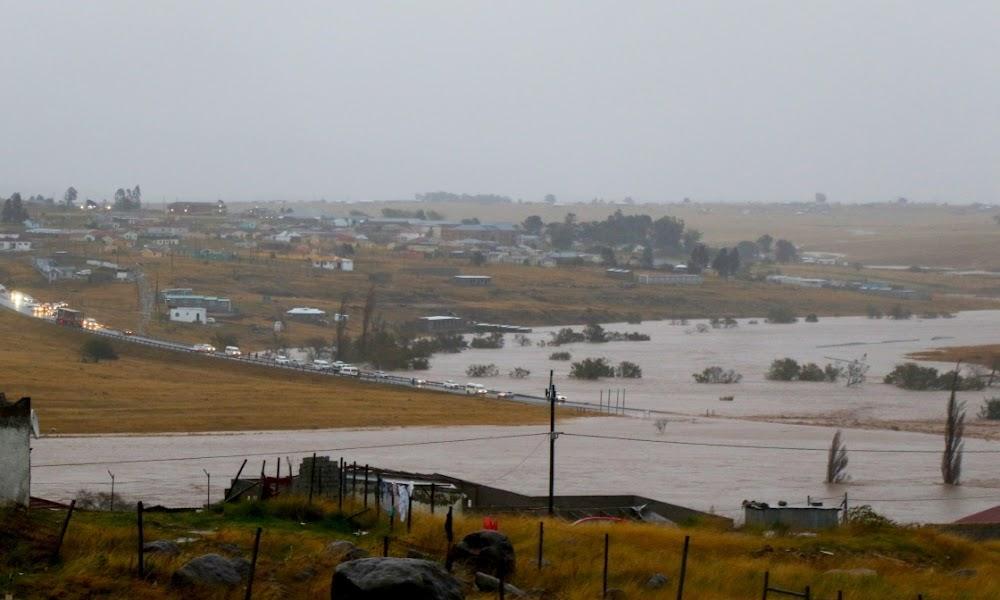Africa-Press – South-Africa. A cold front sweeping across South Africa has unleashed a wave of severe weather, plunging large parts of KZN and the Eastern Cape into crisis. Heavy snow, torrential rain, gale-force winds and freezing temperatures have caused widespread disruption, power outages, road closures, and at least one near-tragic incident involving schoolchildren.
SA Weather Service forecaster Lehlogonolo Thobela said with the cut-off low weather system expected to persist over the interior, it is yet to affect the eastern half and coastal areas of the Eastern Cape.
Further, he said, there has been an updated weather warning of Orange Level 9 for disruptive rain that’s expected to affect the eastern half of the Eastern Cape into the coastal areas.
“Disruptive rain is expected to result in flooding. Widespread flooding of roads and settlements, a danger to life due to fast-flowing streams or deep waters, widespread transport routes and travel services are expected to be severely affected, widespread prolonged disruptions to essential services like water, electricity, communities and schools. The weather service warns the public to be aware of the weather warning. It is an Orange Level 9, which is quite severe in terms of affect with a medium likelihood,” he said.
Some of the reported incidents include a scholar transport bus being swept away at Efata Bridge while on its way to Jumba Senior Secondary School. According to the South African National Taxi Council (SANTACO), three pupils were rescued after clinging to trees. The exact number of passengers remains unclear, as pupils are attending school on staggered schedules due to exams.
In KwaZulu-Natal, snow blanketed areas in the Harry Gwala, uThukela, and Ugu districts, leading to the closure of the N2 between Ingeli and Kokstad. Uprooted trees have blocked key routes including the N3, with winds reaching speeds of up to 110km/h. Disaster management teams have been deployed across the province, working to clear roads and restore power where trees have downed power lines.
Senzelwe Mzila, spokesperson for the provincial department of co-operative governance and traditional affairs said they were actively responding to weather-related incidents.
“Teams are clearing roads and repairing damaged infrastructure,” he said.
Mzila said municipal teams are working in affected communities to clear roads blocked by fallen trees.
“These teams are also working hard to ensure that power is restored where power lines have been damaged by falling trees. There are areas within the province where wind speeds have clocked 110km/hr,” he said.
The MEC for co-operative governance and traditional affairs, Rev Thulasizwe Buthelezi, has urged residents, especially motorists, to exercise extreme caution. He advised avoiding routes that have been closed due to snow, telling parents and guardians to ensure that scholars use safe and appropriate routes.
The Road Traffic Inspectorate (RTI) has closed a section of the N2 due to snowfall about Kokstad and Port Shepstone.
RTI officials are monitoring major routes in consultation with the N3 toll concession. The focus is on the N2 Kokstad and Port Shepstone, N3 between Harrismith, the Tugela toll plaza, the regional road between Kokstad and Underberg, Ingeli and N3 Mooi River.
Eskom has confirmed that its technical teams are battling weather-related outages in several regions in KwaZulu-Natal and the Eastern Cape.
Damaging gale-force winds, rain and snow overnight has interrupted electricity supply to about 300,000 customers in areas in the Eastern Cape, the utility said.
According to SAWS, affected areas include Mthatha, Qumbu, Tsolo, Elliotdale, Matatiele, Mount Frere, Bizana, Mount Ayliff, Elliot, Komani, Dutywa, Butterworth and Cofimvaba.
Joburg emergency services’ Robert Mulaudzi said in most parts of the city residents are urged to exercise caution when using heaters.
“Do not leave them unattended while in use. Residents are advised to use braziers or imbaulas only in well-ventilated areas and to extinguish them before going to bed. Residents who are using heaters must not leave them unattended while in use. Residents who are using candles must ensure they are in stable holders,” Mulaudzi said.
Mulaudzi said the Johannesburg emergency management services, together with the disaster management monitoring teams, are on high alert and monitoring all seven regions of the city.
For More News And Analysis About South-Africa Follow Africa-Press






